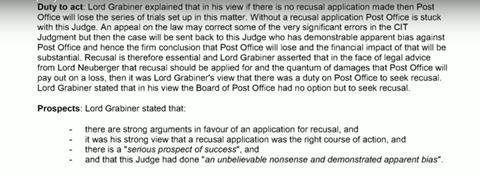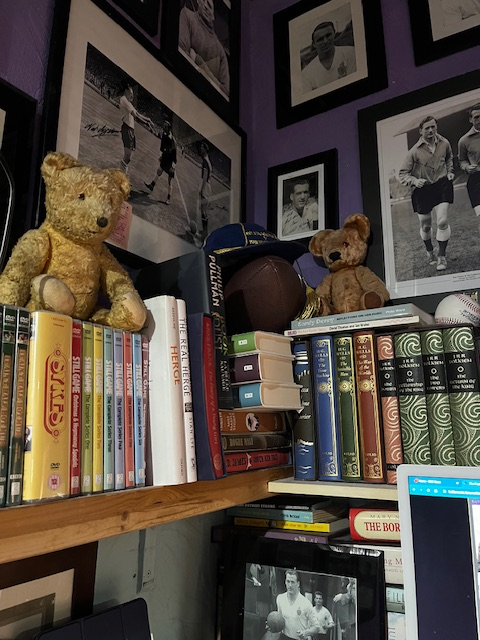An interesting morning at the inquiry listening to one of the POL Barristers who defended in the Bates v Post Office trial - 'Tony' Robinson.
Now Mr Robinson deals with civil cases NOT criminal and disclosure issues are different between the two.
He made it clear that his counsel was given on a strictly civil basis - he did not know disclosure rules in respect of criminal cases.
The first thing he asked within a week into being taken on by POL was to ask of his instructing solicitors Bond Dickinson about whether there was remote access!
He was very scathing of POL in terms of disclosure through his appearance at the High Court trial and beyond.
One of the first things he was asked advice on (before the court case had even started was the 'stopping' of the Chair of POL undertaking the recommendations of the Swift report, which basically would have led to the fact that Jenkins did not give full disclosure and all prosecutions using his evidence would as a result become 'unsafe'.
He advised that in his clients (POL) interest that the Chair should not continue with Swift BUT Swift should be continued by some one else as that would provide the same outcome BUT would become LEGALLY PRIVERLEDGED in terms of civil law.
This privilege would hold in civil courts but may have to be waived in criminal courts.
11.15am: General counsel Jane MacLeod wrote to colleagues in 2016 to say that given proceedings had been commenced by sub-postmasters, the Swift Review should be ended immediately, based on ‘very strong advice from external legal advisers’.
Beer points out the justification for this is not consistent with the email exchange between Parsons and Robinson. Robinson accepts this.
Andy Parson is POL's solicitors instructing Robinson.
Robinson first became aware of Jenkins being 'unsafe' just TWO WEEKS before of the trial defence had to be submitted!
11.40am: The inquiry hears that Robinson was only told about the Clarke Advice in 2018 - and only 17 days before the Post Office was due to file its defence
Robinson says he was 'disappointed' by the process of evidence gathering and says it often felt like firefighting, adding that dealing with the Post Office was 'exquisitely painful' and made it difficult to do his job properly.
11.50am: The big question was whether Jenkins should be called as a witness in the Horizon litigation. He was, after all, previously regarded as the biggest expert on the Horizon system and had been the only prosecution expert in dozens of cases.
In his witness statement, Robinson says he felt at the time that Jenkins was an 'obvious candidate' to appear as a witness for the Post Office.
But this changed after a meeting with Post Office's criminal firm Cartwright King.
Robinson says of this meeting: 'The upshot was that I was told in emphatic terms that Mr Jenkins was not a reliable witness. The solicitors said that Mr Jenkins had given misleading evidence. They suggested in no uncertain terms that I should be very cautious about calling him as a witness.'
12pm: Beer asks Robinson to clarify why Jenkins was not called as a witness in the Horizon litigation. The KC agrees that Jenkins had given misleading evidence and had been in breach of his duties to the court.
But then this: contemporaneous case notes from Bond Dickinson (which by this stage had become Womble Bond Dickinson) admitting that it had been explained to Fujitsu that the Post Office did not want to call Jenkins 'because we did not want to mix civil and criminal justice'.
Beer suggests that if that explanation was given to Fujitsu then that was false. Robinson agrees, suggesting that the form of words was 'ambiguous'. Beer replies that it is a 'bit more than ambiguous' and that lawyers were, on this evidence, not providing a true reason for not asking Jenkins to appear.
12.10pm: In the same case note, it is stated that claimant firm Freeths wrote in January 2019 asking why Jenkins was not a defence witness. The note records that lawyers responded ‘pointing out that Dr Jenkins had acted as expert witness in relation to a number of prosecutions that are being review by the CCRC and it was therefore not appropriate to call him’.
Robinson, who had not provided this information himself, admits this explanation was ‘economical with the truth’ and therefore false.
12.20pm: Despite Jenkins not appearing as a witness at the trial, he was working behind the scenes advising on aspects of Horizon. Robinson says he was dissatisfied at how Jenkins kept 'popping up'.
But despite the discredited witness' work on trial preparation, this involvement was not disclosed to the claimants, prompting heavy criticism from Mr Justice Fraser in his lengthy judgment. Fraser said Jenkins' work behind the scenes was 'simply hidden'.
Robinson tells the inquiry: 'To say I am cross [about the non-disclosure of Jenkins' involvement] is an understatement.'
He explains there was a protocol in place whereby every exchange between Fujitsu and the Post Office's nominated expert witness was to be witnessed and recorded by Womble Bond Dickinson. This in turn should have been disclosed to the claimant lawyers. Robinson says it should 'never have been possible' that Jenkins' role might not be disclosed and he is 'astonished' that it happened.
'Any failure to record the information [passed from Fujitsu] and provide that information to [the claimants] would have been Womble Bond Dickinson's failure,' adds Robinson.
The next bit is interesting Robinson is basically saying he gave a 'nod and a wink [my words -Sluffy] to the High Court judge that Jenkins was an unsafe witness and not used - ie dig about judge and look into what's gone on here in respect of Jenkins in this and other cases!
12.40pm: Back again, this time going to the Post Office's 500+ pages of closing submissions in the Horizon litigation, signed off by Robinson.
Beer takes the inquiry to this passage at paragraph 144 where the Post Office lawyers address Jenkins' absence from court. There is no mention of the Clarke Advice here or admissions about the privately-expressed concerns about Jenkins appearing at trial as a witness.
Beer asks whether the explanation provided here give the true reasons for Jenkins not being called. Robinson says it does. Beer follows up by asking whether Robinson and his team are being open and candid with the court.
Robinson replies: 'It was being made clear there were issues in relation to what Mr Jenkins had said or not said in criminal cases which would have become the focus of attention. In my view that gave a fair indication to the judge of the concerns that Post Office had.'
12.50pm: Beer really pushing at this suggestion that lawyers misled Fraser about the reasons for Jenkins not appearing. He states again that Jenkins was proved to be unreliable and gave false evidence, pointing out that none of this was explicitly referred to in the Post Office's explanation.
Robinson replies: 'Paragraph 144 signals to the judge [the reasons for not calling Jenkins]. It doesn't do so with the emphasis you would probably suggest is required but I do not accept that was misleading. In the eyes of an experienced litigator that would have signalled quite clearly what the real concern was.'
Beer looks aghast, responding: 'Really, you think that signals quite clearly? Is that really what you are saying?'
Robinson basically says that the judge would easily pick out that there is something in this document that stands out like a sore thumb and that would ring alarm bells with him - and it clearly did!!!
Asked later in the inquest why the Clarke advice was not disclosed at the trial, Robinson simply says it couldn't because it was 'privileged' from Clarke to POL (and I'm putting words in to his mouth here but he did the same job by his nudge and a wink to the judge in POL's Closing Submission at the High Court.
https://www.lawgazette.co.uk/news/post-office-live-lawyer-admitted-providing-political-cover-for-post-office/5119968.article
Now Mr Robinson deals with civil cases NOT criminal and disclosure issues are different between the two.
He made it clear that his counsel was given on a strictly civil basis - he did not know disclosure rules in respect of criminal cases.
The first thing he asked within a week into being taken on by POL was to ask of his instructing solicitors Bond Dickinson about whether there was remote access!
He was very scathing of POL in terms of disclosure through his appearance at the High Court trial and beyond.
One of the first things he was asked advice on (before the court case had even started was the 'stopping' of the Chair of POL undertaking the recommendations of the Swift report, which basically would have led to the fact that Jenkins did not give full disclosure and all prosecutions using his evidence would as a result become 'unsafe'.
He advised that in his clients (POL) interest that the Chair should not continue with Swift BUT Swift should be continued by some one else as that would provide the same outcome BUT would become LEGALLY PRIVERLEDGED in terms of civil law.
This privilege would hold in civil courts but may have to be waived in criminal courts.
11.15am: General counsel Jane MacLeod wrote to colleagues in 2016 to say that given proceedings had been commenced by sub-postmasters, the Swift Review should be ended immediately, based on ‘very strong advice from external legal advisers’.
Beer points out the justification for this is not consistent with the email exchange between Parsons and Robinson. Robinson accepts this.
Andy Parson is POL's solicitors instructing Robinson.
Robinson first became aware of Jenkins being 'unsafe' just TWO WEEKS before of the trial defence had to be submitted!
11.40am: The inquiry hears that Robinson was only told about the Clarke Advice in 2018 - and only 17 days before the Post Office was due to file its defence
Robinson says he was 'disappointed' by the process of evidence gathering and says it often felt like firefighting, adding that dealing with the Post Office was 'exquisitely painful' and made it difficult to do his job properly.
11.50am: The big question was whether Jenkins should be called as a witness in the Horizon litigation. He was, after all, previously regarded as the biggest expert on the Horizon system and had been the only prosecution expert in dozens of cases.
In his witness statement, Robinson says he felt at the time that Jenkins was an 'obvious candidate' to appear as a witness for the Post Office.
But this changed after a meeting with Post Office's criminal firm Cartwright King.
Robinson says of this meeting: 'The upshot was that I was told in emphatic terms that Mr Jenkins was not a reliable witness. The solicitors said that Mr Jenkins had given misleading evidence. They suggested in no uncertain terms that I should be very cautious about calling him as a witness.'
12pm: Beer asks Robinson to clarify why Jenkins was not called as a witness in the Horizon litigation. The KC agrees that Jenkins had given misleading evidence and had been in breach of his duties to the court.
But then this: contemporaneous case notes from Bond Dickinson (which by this stage had become Womble Bond Dickinson) admitting that it had been explained to Fujitsu that the Post Office did not want to call Jenkins 'because we did not want to mix civil and criminal justice'.
Beer suggests that if that explanation was given to Fujitsu then that was false. Robinson agrees, suggesting that the form of words was 'ambiguous'. Beer replies that it is a 'bit more than ambiguous' and that lawyers were, on this evidence, not providing a true reason for not asking Jenkins to appear.
12.10pm: In the same case note, it is stated that claimant firm Freeths wrote in January 2019 asking why Jenkins was not a defence witness. The note records that lawyers responded ‘pointing out that Dr Jenkins had acted as expert witness in relation to a number of prosecutions that are being review by the CCRC and it was therefore not appropriate to call him’.
Robinson, who had not provided this information himself, admits this explanation was ‘economical with the truth’ and therefore false.
12.20pm: Despite Jenkins not appearing as a witness at the trial, he was working behind the scenes advising on aspects of Horizon. Robinson says he was dissatisfied at how Jenkins kept 'popping up'.
But despite the discredited witness' work on trial preparation, this involvement was not disclosed to the claimants, prompting heavy criticism from Mr Justice Fraser in his lengthy judgment. Fraser said Jenkins' work behind the scenes was 'simply hidden'.
Robinson tells the inquiry: 'To say I am cross [about the non-disclosure of Jenkins' involvement] is an understatement.'
He explains there was a protocol in place whereby every exchange between Fujitsu and the Post Office's nominated expert witness was to be witnessed and recorded by Womble Bond Dickinson. This in turn should have been disclosed to the claimant lawyers. Robinson says it should 'never have been possible' that Jenkins' role might not be disclosed and he is 'astonished' that it happened.
'Any failure to record the information [passed from Fujitsu] and provide that information to [the claimants] would have been Womble Bond Dickinson's failure,' adds Robinson.
The next bit is interesting Robinson is basically saying he gave a 'nod and a wink [my words -Sluffy] to the High Court judge that Jenkins was an unsafe witness and not used - ie dig about judge and look into what's gone on here in respect of Jenkins in this and other cases!
12.40pm: Back again, this time going to the Post Office's 500+ pages of closing submissions in the Horizon litigation, signed off by Robinson.
Beer takes the inquiry to this passage at paragraph 144 where the Post Office lawyers address Jenkins' absence from court. There is no mention of the Clarke Advice here or admissions about the privately-expressed concerns about Jenkins appearing at trial as a witness.
Beer asks whether the explanation provided here give the true reasons for Jenkins not being called. Robinson says it does. Beer follows up by asking whether Robinson and his team are being open and candid with the court.
Robinson replies: 'It was being made clear there were issues in relation to what Mr Jenkins had said or not said in criminal cases which would have become the focus of attention. In my view that gave a fair indication to the judge of the concerns that Post Office had.'
12.50pm: Beer really pushing at this suggestion that lawyers misled Fraser about the reasons for Jenkins not appearing. He states again that Jenkins was proved to be unreliable and gave false evidence, pointing out that none of this was explicitly referred to in the Post Office's explanation.
Robinson replies: 'Paragraph 144 signals to the judge [the reasons for not calling Jenkins]. It doesn't do so with the emphasis you would probably suggest is required but I do not accept that was misleading. In the eyes of an experienced litigator that would have signalled quite clearly what the real concern was.'
Beer looks aghast, responding: 'Really, you think that signals quite clearly? Is that really what you are saying?'
Robinson basically says that the judge would easily pick out that there is something in this document that stands out like a sore thumb and that would ring alarm bells with him - and it clearly did!!!
Asked later in the inquest why the Clarke advice was not disclosed at the trial, Robinson simply says it couldn't because it was 'privileged' from Clarke to POL (and I'm putting words in to his mouth here but he did the same job by his nudge and a wink to the judge in POL's Closing Submission at the High Court.
https://www.lawgazette.co.uk/news/post-office-live-lawyer-admitted-providing-political-cover-for-post-office/5119968.article

 Home
Home











